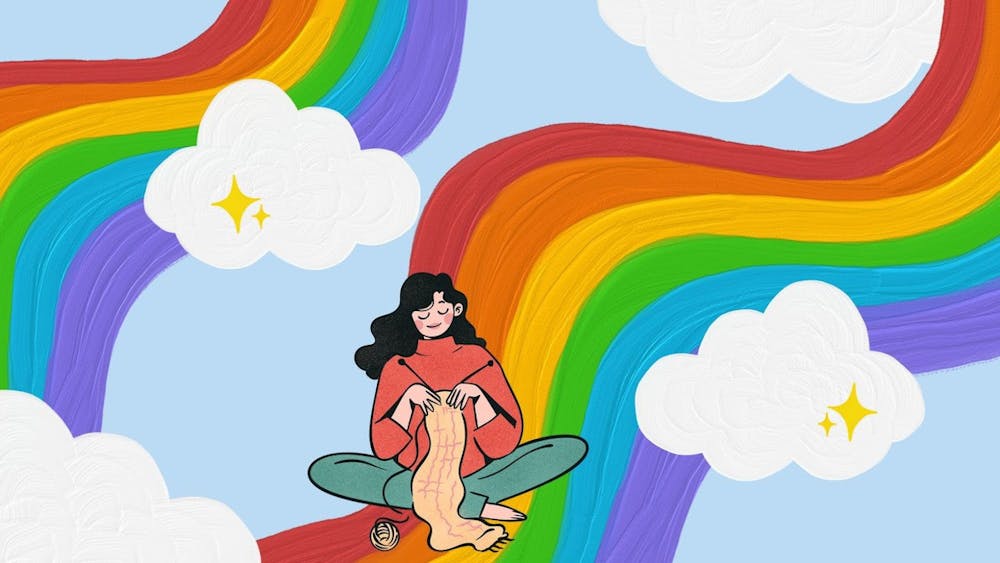When I started high school in 2019, everyone saw the “gays and lesbians” as the new big thing in Macedonia.
I recall a time when books and publishers were fetishizing the “new normal” plaguing us from the West and the U.S. There were bold movies normalizing gay romance, and protests were held for the first time. All of a sudden, the rainbow turned from a playful object in children’s books to the most controversial topic at dinner tables.
Retrospectively, the queer journey represented a sort of exotic other-worldly experience.
I remember reading many novels written “by the queers for the queers,” and scrolling through progressive platforms online featuring girls and boys kissing and then deleting my history and hiding my books as my heart was fighting with itself for a breather. I was scared, yet not so much from the judgment I knew would follow, but more from my own mind where these secrets of love, joy, humanity and confusion hid.
I firmly believed that my curiosity for women had no substance as long as it existed between me and my best friend, a girl that I would kiss occasionally. I thought in all naivete that it’s just what girls do.
One day, carrying all the confusion, I confessed some of my thoughts to my mother. This was the only time we ever talked about it before, and she decided with my other family members to send me to some sort of Balkan conversion therapy.
Macedonian culture didn’t yet know how to fully describe my experiences. It felt like the words “Macedonian” and “queer” were antonyms. When I came to Ohio as an international student, this dichotomy strengthened. All the voices in my head were pointing to the idea of giving up one or the other.
I understood quickly that my queer experience was quite different from the average American or Ohioan queer experience, but I am also not connected to my cultural heritage in the same way my peers at home were.
I never believed in conversion therapy, especially not the one I received since my therapist turned out to be a lesbian. I often reminisce about this woman in her 40s listening to my stories as if they were her own, trying to persuade me that Macedonia is no land for queer people.
Three years later, during this past winter break, I remembered her wrinkled face again. I remembered her eyes that looked like black holes sucking up my soul every time I opened my mouth and tried to grasp the deeper meaning of my existence as a fellow lesbian.
I remember my smile slowly fading away when she told me that all her queer friends had moved to Sweden and Germany to live their lives. After once stalking her Facebook, I saw she moved to Norway and has a wife.
“Oh, how the tables have turned!” I thought to myself, realizing that I have completely shut down my queerness for the last two years.
Enjoy what you're reading?
Signup for our newsletter
In preparation for college in Ohio, I took out my piercings, re-dyed my hair and camouflaged myself as the average straight girl succumbing to the wishes of my family and country. I never thought Ohioans would judge me, but I still tended to hide that part of myself.
I always somehow ended up in a room full of queer conversations. As an international student living with Balkan queerness at Miami University, it felt like every peer I met was an expert in living their queer truth. Confused and frustrated after a very difficult fall semester this December, I left for winter break.
The thought of this winter break excited and terrified me at the same time. Going back to the Balkans, remembering the places that I once called home, I quickly realized how much they have changed.
Through unfamiliar landscapes and different people among the crowds, I saw her. She was an old acquaintance, someone I met and haven’t spoken to in three years. She reached out to me out of nowhere on Instagram.
“You are in my city and how dare you not call me?” she said as if we had never stopped talking at all. We decided to meet up.
The night before we went out I sat and prayed that she wouldn’t turn my stomach upside down, that I wouldn’t feel the need to look into her eyes and kiss her like I did when I first met her.
She felt like a tornado, making me forget all the times I let go of my queer self to be the bigger person for society. I admired her — so comfortable in her clothes, with her identity, smiling like she had conquered herself.
After reconnecting, I didn’t feel any more pain, estrangement or the need to escape my queer body. Looking into her eyes, I knew I would come back to Ohio feeling more at home than ever.
At first, I thought that winter break would be very long, then I wished it would never end. It’s funny how some people enter our lives and change them forever.
Re-engaging with our past selves can often lead to discovering the most authentic versions of ourselves.
Anastasija Mladenovska is a second-year political science, finance and Russian, East European & Eurasian studies triple major from Macedonia. She is involved with the Honors College and Scholar Leaders. She also volunteers for the League of Women Voters of Oxford.




